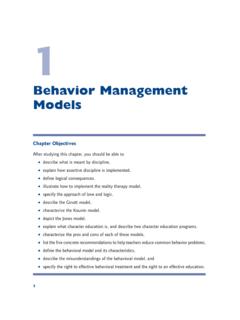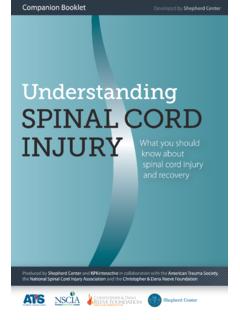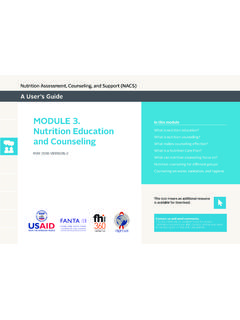Transcription of What is Conscious Discipline? - HIT Inc.
1 what is Conscious Discipline? Conscious Discipline is a comprehensive classroom management program and a social-emotional curriculum. It is based on current brain research, child development information, and developmentally appropriate practices. Conscious Discipline has been specifically designed to make changes in the lives of adults first. The adults, in turn, change the lives of children. Conscious Discipline is a way or organizing schools and classrooms around the concept of a School Family. Each member of the family both adult and child learns the skills needed to successfully manage life tasks such as learning, forming relationships, communicating effectively, being sensitive to others' needs and getting along with others. Conscious Discipline empowers teachers and other adults with the Seven Powers for Self Control. These powers change the adults' perception and relationship with conflict, empowering them to be proactive instead of reactive during conflict times.
2 These core beliefs strengthen our utilization of the frontal lobes of the brain. The frontal lobes are to the brain as a conductor is to an orchestra. The frontal lobes are our moral leader. From the beliefs instilled with the Seven Powers for Self Control emerge the Seven Basic Skills of Discipline. These skills change how adults respond to conflict in such a way as to facilitate the development of the frontal lobes in children. The Seven Skills are the only skills an adult needs to constructively transform conflict into teaching moments. Through the Powers and Skills, adults stay in control of themselves and in charge of children. As adults begin to change their attitudes and behaviors, so will the children in their care. We cannot teach behaviors and skills that we do not possess ourselves. Dr. Becky Bailey, the author of Conscious Discipline , originally designed the program for classrooms, but the Brain Smart strategies imparted by the Seven Powers for Self Control and the Seven Basic Skills of Discipline are seamlessly applied to all human interactions.
3 She has since developed Conscious Discipline for parents and Brain Smart strategies for businesses. Source ~ what does Conscious Discipline do? The most frequent comment heard in response to the Conscious Discipline program is that it is life-changing. The Seven Powers and the Seven Skills taught in the program enhance adults' social-emotional intelligence in perceptible ways. Conscious Discipline teaches relationship skills that help adults in all of their interactions, so that improvement is seen at home with family, at work with colleagues, and at school with children. This single program, offering such a broad life-changing approach, is extraordinarily effective and meaningful for those who are willing to make the change. Conscious Discipline leads parents, teachers, administrators, staff and employees through a process that promotes permanent behavior changes in both adults and children.
4 The paradigm of change is from a traditional compliance model of discipline, relying on lower brain center approaches of threat and force, to a relationship-based community model that relies on higher-order thinking skills. Conscious Discipline educates adults by establishing an understanding of brain development. Once a basic knowledge is established, Conscious Discipline then draws out the relationships between brain development, learning and behavior. Ultimately, Conscious Discipline uses this information to deliver specific ways to create safer, more caring and more responsive environments for schools, homes and workplaces. More on Conscious Discipline: Research on brain function shows that learning takes place in an emotional and behavioral context. When children can attach academic skills to feelings and actions that are part of their everyday world, they are more likely to use those skills.
5 Conscious Discipline creates a School Family that fosters meaningful academic and social learning together. Every classroom management system must have a core motivator. The motivator in Conscious Discipline is the School Family. Connection, belonging and contribution within the School Family create cooperation among children. Students are intrinsically motivated to be helpful, responsible and caring classroom citizens. Conscious Discipline is specifically designed to teach the following: Anger management Helpfulness (pro-social skills). Assertiveness Impulse Control Cooperation Empathy Problem solving Real-life conflict and challenging situations serve as character education curriculum for the Conscious Discipline classroom. Conflict is viewed as a teaching opportunity and adults are empowered to transform it into a valuable lesson. Character education is part of everyday life, not an activity that occurs separately.
6 Conscious Discipline builds self-esteem by addressing children's universal need to be generous and contributing members of a group. Each child holds a job and is responsible for the effective running of the classroom. Conscious Discipline moves a step beyond positive discipline by helping adults become Conscious of themselves. This consciousness increases effectiveness and fosters a reflective, thinking mind by strengthening the frontal lobes of the brains of those who exercise its principles. The frontal lobes are the CEO of the brain. They allow impulse control, problem solving, empathy and proactive strategies during difficult situations. Consciousness allows adults to teach by example. Example is, by far, the most powerful teaching technique available. Children who observe discrepancies between what is practiced and what is preached are likely to imitate the behavior they see modeled.
7 You must model calmness, respect, responsibility, etc. if you want children to display calmness, respect, responsibility, etc. Conscious Discipline links home and school, as the School Family is seen as an extension of the home family. The School Family provides the infrastructure in the classroom to handle difficult life events in a child's life, in the community and in the world. Conscious Discipline operates on a basis of creating physical and psychological safety for children. Research shows that the brain functions optimally in a safe, stimulating environment. This principle is at the program's core. Sourc




